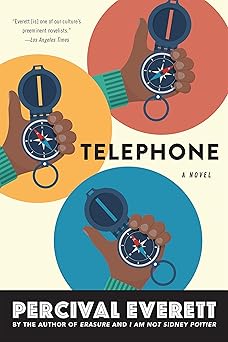
All Formats & Editions
📖 Telephone by Percival Everett: A Quietly Devastating Meditation on Grief and the Roads Not Taken
Some books speak in whispers rather than shouts—books that don’t demand attention but quietly take hold of your heart and linger in your thoughts long after the last page. Telephone by Percival Everett is one of those novels.
It’s haunting, not because of what it tells you but because of what it allows you to feel. I came into it expecting a story, but what I found was something deeper—an unravelling. Of certainty. Of control. Of love in the face of loss. Everett gives us a novel that feels like real life: unpredictable, unfair, and achingly fragile.
And here’s the thing that makes Telephone unforgettable—it doesn’t offer just one version of a story. It offers three. Yes, three different endings. Three parallel narratives ask: What if a single moment, a tiny decision, could shift everything?
🌿 The Story (Without Spoilers)
At the centre of Telephone is Zach Wells, a geologist and paleobiologist whose ordered academic life is thrown into chaos when his teenage daughter, Sarah, is diagnosed with Batten disease—a rare and fatal neurodegenerative illness. As the inevitability of her decline becomes real, Zach’s world begins to splinter.
And then something strange happens: he finds a note—folded, cryptic, hidden in a thrifted jacket. What starts as an oddity quickly morphs into a kind of mission, sending him to New Mexico on a quiet, almost surreal rescue journey involving trafficked women. It sounds improbable, even absurd—but in grief, don’t we all look for some kind of purpose, some wild act that makes the pain make sense?
This isn’t a thriller. It’s not about saving the world. It’s about a man trying to make sense of a life that suddenly doesn’t. And the beauty is that Everett allows us to follow three different paths of what this grief and pursuit of redemption might look like.
🧭 The Mood, the Tone, the Themes
Reading Telephone feels like walking through fog. Not in a confusing way—but in a way that mirrors what it means to live with grief. Everything feels muted, softened around the edges, as if Zach is constantly trying to catch his breath and find clarity.
The tone is tender, restrained, and philosophical. The writing is emotionally rich without being heavy-handed—Percival Everett has a quiet way of breaking your heart.
💔 Themes That Echo Deeply
- Grief: Deep, raw, and unfiltered. This isn’t the kind of book where grief is romanticized. It’s isolating, awkward, and disorienting. Everett captures it perfectly.
- Redemption: Zach’s strange, winding journey to New Mexico becomes a metaphor for the way we grasp meaning when everything else is slipping away.
- Ambiguity of Life: The fact that there are three versions of the novel—each with different endings—speaks to one of Everett’s most haunting truths: life is not neat. We don’t get a single, clear narrative. We get choices. Possibilities. And no one knows which version is “right.”
- Communication & Miscommunication: Like the childhood game of “telephone,” messages shift, intentions blur, and nothing is ever fully understood. Zach’s inability to truly “speak” to his daughter—emotionally or existentially—is one of the most painful threads in the story.
💬 How This Book Made Me Feel
I read this book in one long sitting, and then I sat in silence.
It made me think of the what-ifs in my own life. The little detours. The unspoken words. The griefs I carry silently. It made me wonder how much we miss because we don’t know how to look. And how often we love people imperfectly, fumbling through the dark.
And yet, as sad as it is, Telephone didn’t leave me broken—it left me thoughtful. That’s what I love most about Everett’s storytelling. He doesn’t tie things up. He doesn’t fix what can’t be fixed. But he does hold space for your sadness.
🧠 Why Telephone Is Worth Reading
- If you’re looking for something different—narratively daring, emotionally intelligent, and philosophically rich—this book is it.
- If you’ve ever experienced loss or watched someone you love suffer, you will see yourself in Zach’s quiet desperation.
- If you like books that challenge you—not with complexity, but with honesty—you’ll appreciate the raw clarity of Everett’s prose.
- And if you’ve ever wondered how small decisions might shift the course of your life… well, prepare to feel seen.
This is the kind of novel that doesn’t just tell a story—it invites you to question your own.
👥 Who This Book Is For
This book is for the reflective reader. The deep feeler. The ones who don’t mind sitting with discomfort or ambiguity. It’s for lovers of literary fiction, philosophical explorations, and emotionally driven storytelling.
If you’ve appreciated works like Atonement by Ian McEwan, Never Let Me Go by Kazuo Ishiguro, or even Lincoln in the Bardo by George Saunders, Telephone will speak to you.
💌 Final Thoughts
Telephone is not a book you read to escape. It’s a book you read to understand. To connect. Remember that life doesn’t always come with answers—but sometimes, in the asking, we find meaning.
It’s about being human. About fumbling through tragedy with our hands outstretched, hoping to grab onto something—anything—that makes us feel less alone.
So if you’re craving something real, something that dares to be vulnerable, Telephone might be exactly what your heart needs.
If this sounds like your kind of story, I truly hope you’ll give it a place on your shelf—and your soul.
👉 📚 ByOneClick – One Click, Endless Stories.